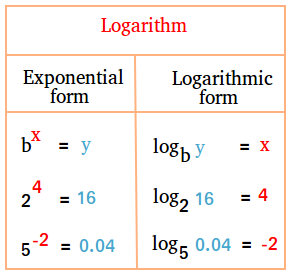What is a logarithm?
What is a logarithm? In mathematics, the logarithm to the base b of a positive number y is defined as follows: If y = bx, then logb y = x
Read logb y as " log base b of y "
Just like we saw in the lesson about exponential function, b is not equal to 1 and b is bigger than zero.
The exponent x in the exponential expression bx is the logarithm in the equation logb y = x
What is a logarithm in easy terms?
Keep in mind that whenever you are looking for the logarithm, you are looking for an exponent, or the number that tells how many times the base is multiplied.
For example, what is the logarithm of the expression log5 25?
2 is the logarithm of the expression log5 25. Why? In the expression, we can see that the base is 5.
Therefore, ask yourself, "5 to the power of what is equal to 25?"
Since 52 = 25, log5 25 = 2.
What is the logarithm of the expression log2 16 ?
Since 2 to the fourth power is equal to 16, log2 16 = 4.
Types of logarithms
The two types of logarithms are the common logarithm and the natural logarithm.
What is a common logarithm?
A common logarithm is a logarithm that uses base 10. Therefore, the expression logb y = x becomes log10 y = x
As a result, you are always looking for the number of times you multiply 10 by itself to get y.
You can write the common logarithm as log10 y or as log y
What is log10 1000?
Since 10 to the third power = 1000, log10 1000 = 3.
What is a natural logarithm?
A natural logarithm, also called natural log is a logarithm that uses base e where e = 2.718281828.
Therefore, the expression logb y = x becomes loge y = x
As a result, you are always looking for the number of times you multiply e by itself to get y.
You can write the natural logarithm as loge y or as ln y. However mathematicians have agreed that the natural logarithm can have its own notation. In most cases we write the natural logarithm as ln y without showing the base e although we know it is there.
What is ln 10?
You are looking for a number x such as (2.718281828)x = 10
You should use a calculator since it is not so easy to find. This lesson shows how to find the natural log using a calculator.
Writing in logarithm form using the exponential form

Write 49 = 72 in logarithm form
Write the definition
If y = bx, then logb y = x
Substitute
If 49 = 72, then log7 49 = 2
The logarithmic form of 49 = 72 is log7 49 = 2
Write 1/8 = (1/2)3 in logarithm form
Write the definition
If y = bx, then logb y = x
Substitute
If 1/8 = (1/2)3, then log1/2 1/8 = 3
The logarithmic form of 1/8 = (1/2)3 is log1/2 1/8 = 3
What is a logarithm used for?
Among others, scientists use logarithms to perform the following tasks:
- Measure acidity in substances called pH
- Find the magnitude of earthquakes
- Find interest rate
Logarithm, earthquake, and the Richter scale
For example, an earthquake that has a magnitude of 7.9 is 11600 times as strong as an earthquake that occurred in the Caribbean. Find the magnitude of the earthquake that occurred in the Caribbean.
The Richter scale is commonly used to measure the magnitude of earthquakes. In the Richter scale, the common logarithm is used and adding a magnitude of 1 makes the earthquake 10 times more powerful. An earthquake of magnitude 7 is 1000 times more power an earthquake of magnitude 4 since 107 / 104 = 107-4 = 103 = 1000
Let x be the magnitude of the earthquake that occurred in the Caribbean.
Then, 107.9 / 10x = 11600
107.9 - x = 11600
log10 11600 = 7.9 - x
4.0644579892 = 7.9 - x
x = 7.9 - 4.0644579892
x = 3.83554201
What is a logarithm? FAQs
-
The logarithm of a number is simply an exponent or the number of times a base is multiplied by itself to get the number. For example, log6 36 = 2. In other words, the base 6 must be multiplied by itself twice(exponent is 2) to get 36.
-
The logarithm with base 10 is called the common logarithm or the decimal logarithm. For example, log10 1000 = 3 is a common logarithm.
-
Yes, a logarithm can be negative. For example, log4 0.25 = -1 In other words, 4-1 = 1/4 = 0.25. While the logarithm or exponent can be negative, you cannot take the logarithm of a negative number. For example, log10 -100 = does not exist. Check this lesson to learn more.